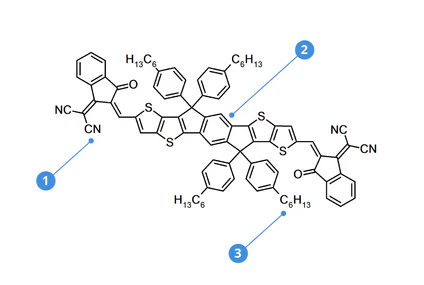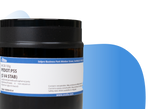ITIC, acceptor molecule for non-fullerene organic solar cells
Low price, high purity (≥99%), ITIC available in sensible quantities
Specifications | MSDS | Literature and Reviews | Related Products
ITIC (CAS number 1664293-06-4) represents the start of a new generation of non-fullerene acceptors for organic photovoltaics (OPVs). The energy levels of ITIC allow for good alignment with low band-gap polymers, resulting in enhanced charge separation efficiency and reduced energy loss. ITIC molecules also have strong and broad absorption characteristics, from the visible region of the electromagnetic spectrum to the near infrared, peaking at 700 nm. This gives it the potential to increase the total absorption of an OPV device and enable improved power conversion efficiencies (PCEs). ITIC has also proved to have excellent thermal stability, with devices showing no losses after being held at 100 °C for 250 hours.
High efficiency non-fullerene acceptor
with highly conjugated core
Enhances charge separation efficiency
with tailored energy level for low bandgap polymers
Worldwide shipping
Quick and reliable shipping
High purity
>99% High purity
These properties have resulted in ITIC becoming the first small molecule electron acceptor to outperform the most efficient fullerene acceptor, PC70BM, in an OPV device when fabricated in a controlled environment, such as a glove box. When used in conjunction with PBDB-T (PCE12) in an inverted-architecture device, ITIC enabled a power conversion efficiency of over 11% to be reached. By comparison, when PC70BM was used as the electron acceptor, a PCE of less than 8% was achieved.
ITIC from Ossila was used in the high-impact paper (IF 29.37), Triplet-Charge Annihilation in a Small Molecule Donor: Acceptor Blend as a Major Loss Mechanism in Organic Photovoltaics, J. Marin-Beloqui et al., Adv. Energy Mater., 2100539 (2021); DOI: 10.1002/aenm.202100539.
Most quantities are available for priority dispatch (lead times may apply for large quantities) and qualifying orders ship free as part of the Ossila Guarantee. Please contact us if you have any questions.
General Information
| CAS Number | 1664293-06-4 |
| Chemical Formula | C94H82N4O2S4 |
| Purity | ≥99.0% (1H NMR) |
| Full Name | 3,9-bis(2-methylene-(3-(1,1-dicyanomethylene)-indanone))-5,5,11,11-tetrakis(4-hexylphenyl)-dithieno[2,3-d:2’,3’-d’]-s-indaceno[1,2-b:5,6-b’]dithiophene |
| Molecular Weight | 1427.94 g/mol |
| HOMO / LUMO | HOMO = -5.48 eV, LUMO = -3.83 eV [1] |
| Synonyms | ITIC |
| Classification / Family | Non-fullerene acceptors (NFAs), organic semiconducting materials, low band gap small molecule, small molecular acceptors (SMAs), organic photovoltaics, polymer solar cells, NF-PSCs, n-type |
Chemical Structure

Pricing
| Batch | Quantity | Price |
| M1101 | 100 mg | £230 |
| M1101 | 250 mg | £460 |
| M1101 | 500 mg | £830 |
| M1101 | 1 g | £1450 |
MSDS Documentation
ITIC Derivatives
The ITIC family of NFAs includes ITIC and several derivatives, some of which offer higher power conversion efficiencies than ITIC itself. We stock a selection of high-purity ITIC derivatives for use in organic and polymer solar cells. Substituents such as fluorine and chlorine, which are electronegative, affect the HOMO and LUMO energy levels of ITIC-based acceptor molecules. In contrast, methyl groups can improve solubility, enhancing processability.
Literature and Reviews
- Non-Fullerene Polymer Solar Cells Based on Alkylthio and Fluorine Substituted 2D-Conjugated Polymers Reach 9.5% Efficiency, H. Bin et al., J. Am. Chem. Soc.,138 (2016), 4657−4664; DOI: 10.1021/jacs.6b01744.
- Fullerene-Free Polymer Solar Cells with over 11% Efficiency and Excellent Thermal Stability, W. Zhao et al., Adv. Mater., 28, 4734–4739 (2016); DOI: 10.1002/adma.201600281.
- An Electron Acceptor Challenging Fullerenes for Efficient Polymer Solar Cells, Y. Lin et al., Adv. Mater., 27, 1170–1174 (2015); DOI: 10.1002/adma.201404317.
Related Products
Semiconducting polymers for bulk heterojunction, OPV, OLED, OFET and perovskite interfaces and solar cell research.

 ITIC MSDS Sheet
ITIC MSDS Sheet




